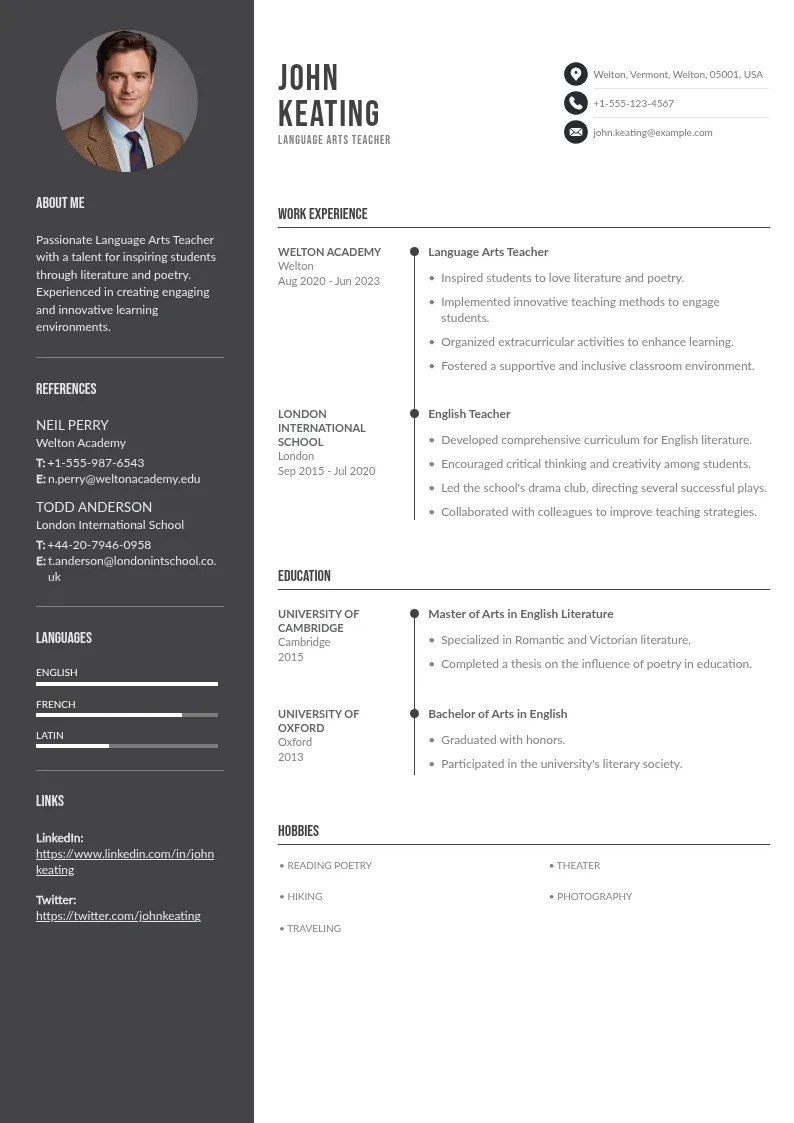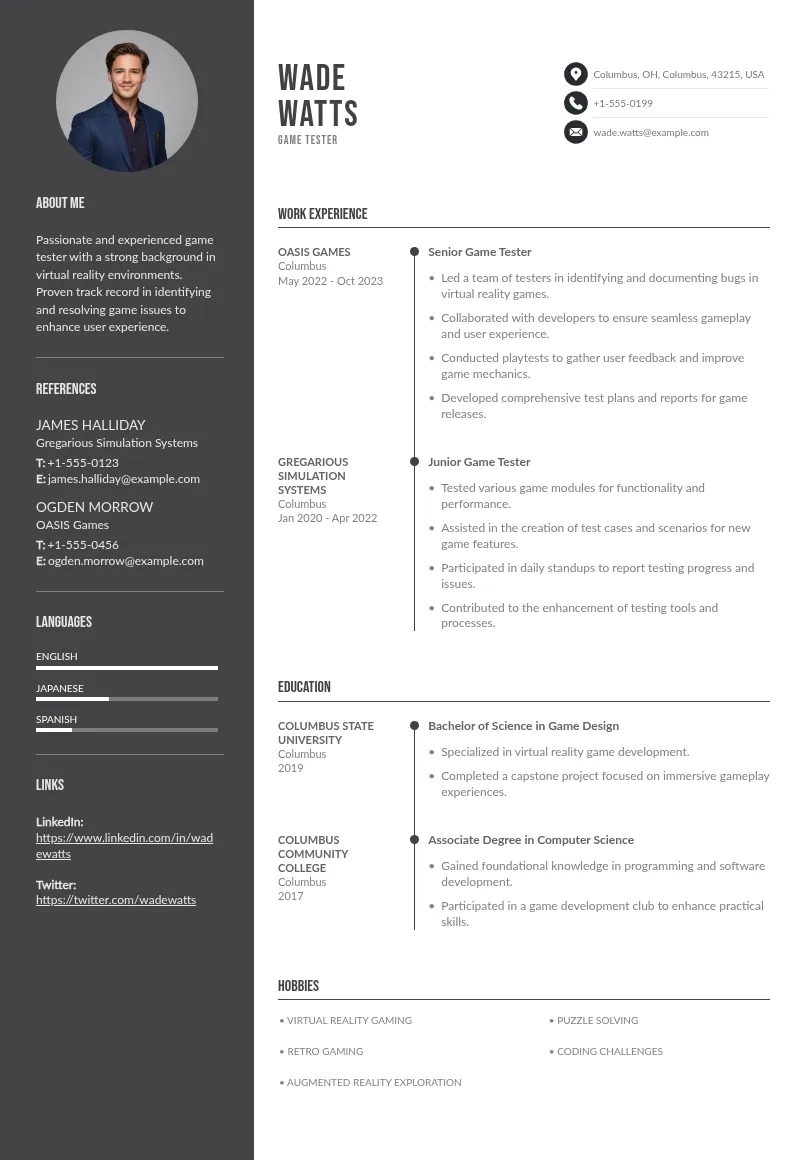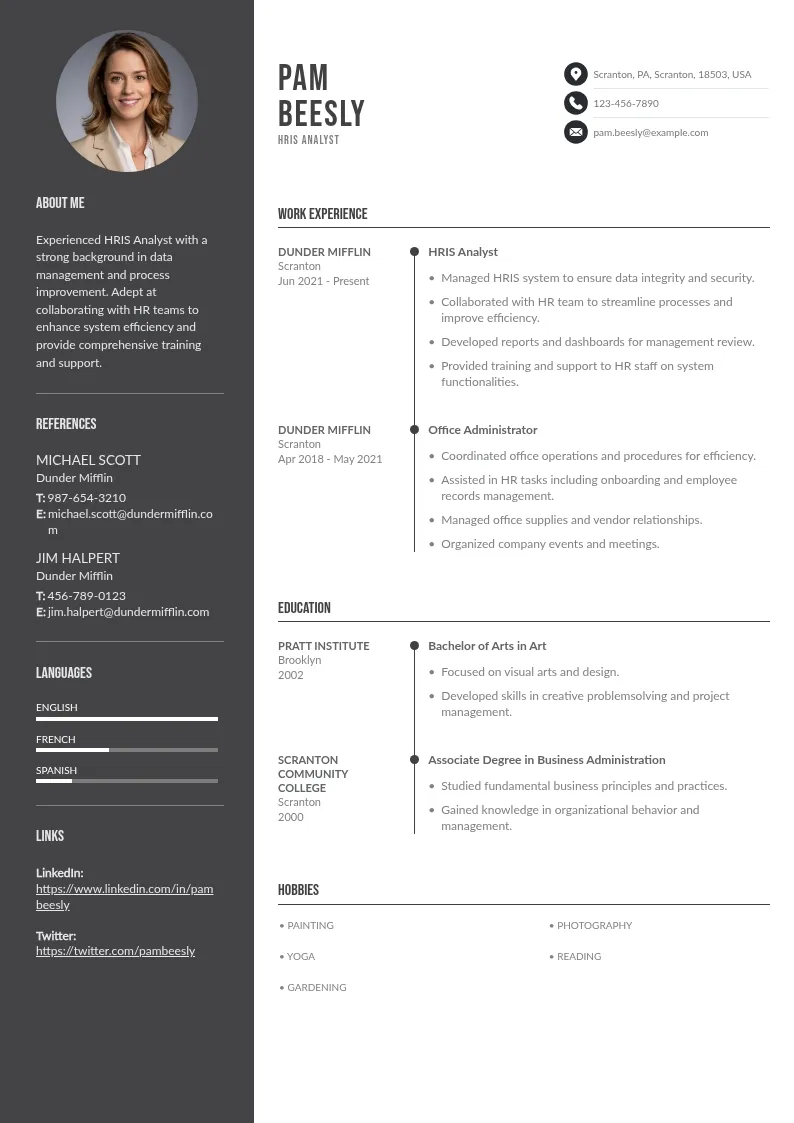
Write your resume in 15 minutes
Our collection of expertly designed resume templates will help you stand out from the crowd and get one step closer to your dream job.


By selecting more impactful synonyms, you can highlight how you excel in taking charge and getting things done without constant supervision. It’s about showing your true potential in a way that catches a hiring manager’s eye. Let’s explore how to make your resume truly shine by upgrading your language choices.

The Top Synonyms for "Independent" on a Resume
If you're ready to retire the word "independent" and replace it with something that truly shows your ability to handle things on your own, you're in the right place. These synonyms will not only capture your skills but also give your resume the boost it needs to stand out.
- Autonomous
- Self-reliant
- Self-sufficient
- Proactive
- Resourceful
- Self-motivated
- Initiative-taker
- Dependable
- Resilient
- Decisive

Replacing "Independent" with Stronger Verbs in Your Resume
Using more specific, action-oriented verbs to describe your independence can elevate your resume instantly. These verbs showcase autonomy, self-reliance, and problem-solving skills while giving hiring managers a clearer view of your contributions and achievements.
Here’s how to make the switch, along with why each change works.
1. Replacing "Independent" with Autonomously
- Before: Worked independently to lead cross-functional teams and implement recruiting strategies.
- After: Autonomously led cross-functional teams to develop and implement recruiting strategies, increasing applicant engagement by 25% while managing project timelines without supervision.
Why this works:
By using "autonomously," you show that you were fully responsible for leading the team and managing all aspects of recruiting initiatives without needing guidance. This demonstrates that you have the ability to make decisions and drive projects forward.
The inclusion of quantifiable results, such as the 25% increase in applicant engagement, reinforces the tangible impact of your autonomy. It paints a picture of someone who thrives on responsibility and delivers measurable success.
2. Replacing "Independent" with Resourcefully
- Before: Worked independently to develop solutions for client needs, reducing project costs.
- After: Resourcefully developed innovative solutions for complex client needs, resulting in a 15% reduction in project costs while managing all deliverables with minimal oversight.
Why this works:
Using "resourcefully" adds a layer of problem-solving to the narrative, showing that you didn't just complete tasks alone, but found creative ways to overcome challenges. This word emphasizes your ability to navigate difficult situations and actively contribute to cost-saving measures.
Including the 15% cost reduction directly ties your resourcefulness to a clear, positive result, making your independence more impressive and results-driven.
3. Replacing "Independent" with Self-reliantly
- Before: Worked independently to manage the maintenance and safety operations for a large facility.
- After: Self-reliantly managed the maintenance and safety operations for a 50,000 sq. ft. facility, reducing incident reports by 20% through proactive inspections and safety protocols.
Why this works:
"Self-reliantly" emphasizes your ability to handle large-scale responsibilities on your own, without the need for constant oversight or direction. This term, coupled with the size of the facility and the specific 20% reduction in incident reports, highlights the extent of your responsibilities and the impact of your work. It makes your role stand out by showing that your independence led to improved safety and efficiency in the workplace.

4. Replacing "Independent" with Proactively
- Before: Worked independently to improve the administrative filing system.
- After: Proactively revamped the administrative filing system, reducing document retrieval times by 40% and streamlining operations across the department.
Why this works:
By using "proactively," you demonstrate that you didn’t just work independently, but you actively sought out areas for improvement and made significant changes. This word highlights initiative, showing that you weren’t just following orders, but taking charge to improve processes. The quantifiable 40% reduction in retrieval times further cements the tangible benefits of your proactive approach, making the example more compelling.
5. Replacing "Independent" with Decisively
- Before: Worked independently to manage client projects as a contractor, delivering results ahead of schedule.
- After: Decisively managed multiple client projects as an independent contractor, consistently delivering results ahead of schedule while meeting all client expectations.
Why this works:
"Decisively" adds a sense of leadership and authority to the description, indicating that you weren’t just working alone, but were making key decisions that drove the projects’ success. This term highlights your demonstrated leadership skills, reflecting both your confidence and ability to make important calls that led to tangible outcomes, such as delivering projects ahead of schedule. It transforms a simple "independent" task into a clear demonstration of strong decision-making and leadership.
6. Replacing "Independent" with Self-motivated
- Before: Worked independently to develop and implement a new customer service strategy.
- After: Self-motivated to develop and implement a new customer service strategy, leading to a 30% increase in customer satisfaction ratings and streamlining the team’s response times by 20%.
Why this works:
"Self-motivated" highlights your internal drive to achieve results without the need for external prompts. This example shows that your motivation directly led to measurable improvements in both customer satisfaction and team efficiency. The focus on tangible outcomes demonstrates that your independence is paired with initiative and clear results, making your contributions stand out.

7. Replacing "Independent" with Initiative-taker
- Before: Worked independently to launch a new product line, boosting sales.
- After: Initiative-taker who independently spearheaded the launch of a new product line, increasing quarterly sales by 15% and expanding the company's market reach.
Why this works:
"Initiative-taker" emphasizes proactive leadership, showing that you didn’t wait for direction, you led the charge. This term highlights your ability to spot opportunities and take action, with the 15% sales increase serving as concrete proof of your success. It moves beyond merely working independently and shows that your independence drives real, strategic results.
8. Replacing "Independent" with Dependably
- Before: Worked independently to handle financial reporting for the company.
- After: Dependably handled all aspects of financial reporting for a mid-sized company, ensuring timely and accurate reports that resulted in a 100% compliance record for the fiscal year.
Why this works:
"Dependably" emphasizes reliability and trustworthiness, showing that you are consistently capable of managing key tasks on your own. By adding specifics, such as the 100% compliance record, this example demonstrates that your independent work was not only consistent but also critical to the company’s financial health. This word choice shows that your independence is grounded in accountability and excellence.
9. Replacing "Independent" with Resiliently
- Before: Worked independently to navigate challenges during a system overhaul.
- After: Resiliently navigated the challenges of a major system overhaul, ensuring zero downtime and leading a team through a high-pressure environment to meet tight deadlines.
Why this works:
"Resiliently" adds a layer of persistence and toughness to your independence. This example shows that, even in the face of difficulties, you maintained control and led your team to success. The focus on zero downtime and managing tight deadlines highlights your ability to handle pressure independently, making your resilience a clear asset in achieving goals under challenging circumstances.
10. Replacing "Independent" with Decisively
- Before: Worked independently to lead negotiations and reduce costs for the company.
- After: Decisively led negotiations for vendor contracts, cutting costs by 12% while maintaining strong partnerships that benefited the company’s long-term goals.
Why this works:
"Decisively" conveys confidence and leadership, showing that you made important decisions that had a direct impact on the company. By including specific results like the 12% cost reduction, this example highlights your effectiveness as an independent decision-maker who not only manages tasks but also adds strategic value. It shows that your independence isn’t just operationa, it’s also influential.

When to Substitute "Independent" with Another Synonym
Knowing when to swap out "independent" for a more precise or impactful synonym is key to making your resume stand out. If you're highlighting your autonomy or problem-solving skills, here’s a simple guide to help you choose the right words to paint the strongest picture of your abilities.
- When to Substitute 'Independent' with Another Synonym: Knowing when to swap 'independent' for a more precise synonym enhances your resume.
- When You’ve Worked Autonomously: Use words like self-reliant, autonomous, or self-sufficient to convey ownership of projects.
- When You’ve Solved Complex Problems: Opt for terms like resourceful, innovative, or analytical to highlight your problem-solving skills.
- When You Need to Showcase Leadership: Choose words like proactive, self-motivated, or initiative-taker to demonstrate your leadership capabilities.
- When You’ve Worked Collaboratively: Consider terms like collaborative, team-oriented, or cooperative to emphasize your teamwork skills.

Effective vs Ineffective Uses of "Independent"
Let’s break down how using "independent" can be either weak or strong, depending on how you frame it. Words matter, and it’s all about showing your independence in a way that highlights your value to potential employers.
Weak Uses
- Independent experienced software engineer who handled daily tasks without supervision.
- I worked independently to complete tasks assigned to me by my manager.
- Independent thinker who enjoys working on their own and solving problems.
- Worked independently on routine administrative tasks, ensuring everything was completed on time.
- I worked as an independent contractor, managing small client projects.
Strong Uses
- Autonomous project manager who independently managed a cross-functional team, delivering a $500,000 project two weeks ahead of schedule.
- Self-reliant human resources specialist who independently revamped the company’s employee onboarding process, improving retention by 15% over the past year.
- Proactive administrative assistant who took initiative in creating a new filing system, reducing document retrieval time by 40%.
- Dependable software engineer with experience working independently to develop and deploy critical system updates for high-profile clients, ensuring zero downtime.
- Decisive independent contractor who consistently delivered complex projects under budget, while managing multiple client expectations independently.
In the weak examples, "independent" is used in a vague and generic way, failing to demonstrate specific outcomes or contributions. On the other hand, the strong examples clearly showcase responsibilities, measurable results, and the impact your independence had in your role. This approach makes your resume far more compelling and paints a clearer picture of your abilities.

Why Is Being an Independent Worker Important on Your Resume?
Highlighting your ability to work independently on your resume can significantly set you apart from other candidates. Here’s why showcasing this skill is crucial:
- It demonstrates trustworthiness. Employers value workers who can be trusted to complete tasks without needing constant supervision, and being independent shows that you can handle responsibility with confidence.
- It highlights your initiative. Independent workers are often self-starters who don’t wait around for instructions. This ability to take the initiative makes you a valuable asset to any team or project.
- It reflects strong problem-solving skills. Independence often requires critical thinking and the ability to tackle complex problems effectively, proving that you can overcome challenges without always relying on others.
- It appeals to remote or flexible work environments. Many companies now prioritize remote work options, and those who can manage tasks independently are particularly attractive candidates for these roles.
- It shows leadership potential. Even if you’re not in a managerial role, working independently suggests that you’re capable of leading yourself, which can easily translate into leading teams or projects.
- It emphasizes your adaptability. Independent workers tend to thrive in various environments, showing that you can adjust and perform well even without a set routine or close oversight.
- It communicates efficiency. Being independent often means managing your time well and prioritizing tasks effectively, which directly contributes to increased productivity and better results in any role.

Highlighting Independent Work in Skills, Activities, and Accomplishments
When it comes to presenting yourself as an independent worker, it’s not just about saying you can work alone but it’s about showing it through your skills, activities, and accomplishments. Here’s how to make it stand out on your resume:
1. Skills That Show Independence
Focus on skills that naturally demonstrate self-sufficiency and initiative. Highlight competencies like self-directed management, critical thinking abilities, and problem-solving skills. These tell employers you don’t just wait for instructions, you take charge and handle tasks efficiently on your own.
2. Showcase Independent Projects
If you’ve taken the lead on projects, especially without direct supervision, make sure to showcase them. Whether it’s independent research, managing a team, or launching a new initiative, these projects highlight your ability to work autonomously while driving results. For example, list accomplishments like “Independently developed a new workflow system that increased team productivity by 20%.”
3. Freelance or Contract Work
Freelancers and independent contractors are naturally seen as independent workers, so don’t shy away from emphasizing this. If you’ve worked as a freelance project manager or handled clients on your own, mention how you’ve tackled complex projects and successfully delivered results under minimal supervision.
4. Accomplishments with Measurable Results
When showcasing independence, always link it to tangible outcomes. Did your ability to work alone help the company save money, meet tight deadlines, or improve productivity? Mention accomplishments like “Independently managed a client portfolio, reducing project turnaround time by 30%.”
5. Remote Work Success
Remote work environments are a great opportunity to highlight your strong independent work ethic. If you’ve thrived in these settings, mention how you’ve adapted to working remotely, handling projects across time zones, or managing your own schedule without oversight. This speaks volumes about your self-reliance and adaptability.
Conclusion
Incorporating stronger verbs to replace "independent" on your resume can make a huge difference in how you’re perceived by hiring managers. By choosing words that clearly showcase your initiative, autonomy, and problem-solving skills, you’ll leave a lasting impression and stand out from the crowd. Time to give your resume the upgrade it deserves and let your independence shine!

















